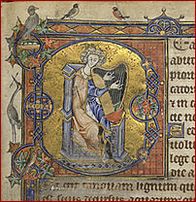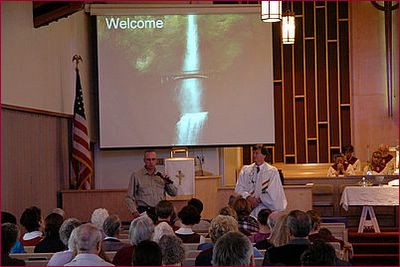On Sunday, 06 March 2005, Mr. Hunter observed that the story of Christ restoring sight to the man blind from birth contains a central irony: the man who was blind from birth is able to
see the divinity of Christ, but the religious leaders who are sighted remain spiritually
blind--blind to the power and mercy of God as revealed in Jesus.
Are we blind, too?
One of the central points of the story lies in Christ's answer to his disciplines, who pose a theological question to him:
"Rabbi, who sinned, this man or his parents, that he was born blind?" Jesus's answer, however, gets to the essence of this story:
"It was not that this man sinned, or his parents, but that the works of God might be made manifest in him" (John 9:3).
When we encounter pain and suffering, we must not ask--as the disciplines did--whose fault is this? We want to point a finger of blame. We want to find out whose
fault it is because it reassures us that we're safe from a similar fate, if we avoid that same sin. Jesus, however, says that we should not try to ascribe blame; instead we should heal and celebrate God's mercy.
When presented with two models--a man blind from birth
versus church leaders who are blind to rebirth--which are we most like? We need to be open to God's possibilities. And as Presbyterians who are trying to conduct the life of our church "decently and in order," we must not become so legalistically bound up with our processes that we miss the miracle.
Mr. Hunter speculated that the mud which Christ placed upon the blind man's eyes and the direction to wash at the pool of Silo'am served as
placebos to focus the man's faith. What does God do to focus our faith?
Perhaps, Pastor Hunter said, this is one of the uses of pain and suffering. Sometimes, it is the bad things in life which make us most strongly aware of God and which strengthen our faith.
In Psalm 23, the
voice of the singer changes from third person ("The Lord is my shepherd") to second person ("
thou art with me") when poet enters the valley of the shadow of death. In other words, when the poet encounters pain and suffering, he address God directly as "thou."
Others have observed this same phenomenon. Dr. Martin Luther King, Jr., said,
"only when it's dark enough can you see the stars" ("Mountaintop Speech," delivered the night before King's assassination).
[Blogger's note: Ralph Waldo Emerson said it first--"When it's dark enough men see stars."]Helen Keller expressed the same idea when she said,
"I thank God for my handicaps, for, through them, I have found myself, my work, and my God."








 The Presbytery of Wyoming will meet in Powell, Wyoming, on Friday-Saturday, 16-17 September 2005.
The Presbytery of Wyoming will meet in Powell, Wyoming, on Friday-Saturday, 16-17 September 2005. That kind of moral obtuseness turned me away from wristbands, until now. I've found a wristband I'm willing to buy and wear:
That kind of moral obtuseness turned me away from wristbands, until now. I've found a wristband I'm willing to buy and wear: 










 I first read
I first read 
 On Palm Sunday, 20 March 2005, Mr. Hunter spoke on the
On Palm Sunday, 20 March 2005, Mr. Hunter spoke on the  The Presbyterian Church (USA) publication
The Presbyterian Church (USA) publication  On Sunday, 20 March 2005, we'll dedicate our
On Sunday, 20 March 2005, we'll dedicate our 


 Home from the Iraqi War to recover from a shattered ankle, Brad Murphy talks at Coffee Time about his experiences at Walter Reed Hospital, as his mother looks on.
Home from the Iraqi War to recover from a shattered ankle, Brad Murphy talks at Coffee Time about his experiences at Walter Reed Hospital, as his mother looks on.



